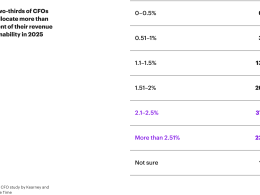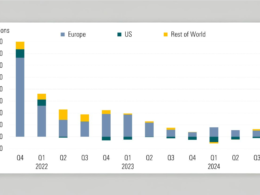ESG-labelled investment funds in Europe could significantly raise their exposure to the defence industry if existing restrictions are fully lifted, according to a new analysis from Morgan Stanley.
The bank’s analysts, including Arushi Agarwal and Rachel Fletcher, estimate that funds classified under the EU’s Article 8 and Article 9 ESG disclosure frameworks could drive between $53 billion and $119 billion in flows into the aerospace and defence sector if exclusion policies on certain weapon types are eased.
“Any potential exclusions easing would seem likely to focus on conventional and nuclear weapons,” the analysts noted. “A full-scale easing of exclusions could drive significant flows.”
Article 8 funds are those that “promote” environmental, social and governance (ESG) characteristics, while Article 9 funds must have ESG as their core investment objective. Currently, these funds’ average exposure to Europe’s defence sector is estimated at around 2% of the sector’s market capitalisation.
The shift in sentiment towards defence assets has already begun, driven in part by geopolitical tensions, including Russia’s ongoing invasion of Ukraine, and calls from European policymakers to strengthen the bloc’s strategic autonomy. Investment managers targeting ESG goals are reportedly increasing holdings in defence firms in response to these developments.
However, Morgan Stanley analysts cautioned that any significant shift in ESG fund allocations would depend on changes to exclusion policies, which could be constrained by international treaties and their incorporation into national legislation. “We would not expect to see a full-scale easing of exclusions,” they wrote, especially in relation to controversial weapons such as biological weapons and cluster munitions.
Despite these limitations, the analysts pointed to “concrete” examples of regulatory and policy moves in countries such as Germany and the UK, suggesting that barriers to defence investment are beginning to be dismantled. In France, Finance Minister Eric Lombard recently argued that ESG rules do not, in principle, prohibit investment in defence, calling such claims a “misunderstanding.”
“Investment in the defence sector is a responsible investment, all the more so because it protects our sovereignty and the principles we uphold,” Lombard said.
In a separate note, analysts at Barclays observed a similar trend, noting that ESG funds are gradually shifting their stance on the defence sector. “Underweights in stocks with exposure to defence have decreased, whilst concurrently the average exposure of ESG funds to the aerospace and defence sector has increased over time,” wrote analysts Magesh Kumar Chandrasekaran and Maggie O’Neal.
The evolving narrative suggests that defence investments—long excluded from ESG portfolios—may increasingly be viewed through the lens of social responsibility and national security, reflecting a broader redefinition of what constitutes a “sustainable” investment in today’s geopolitical landscape.
















